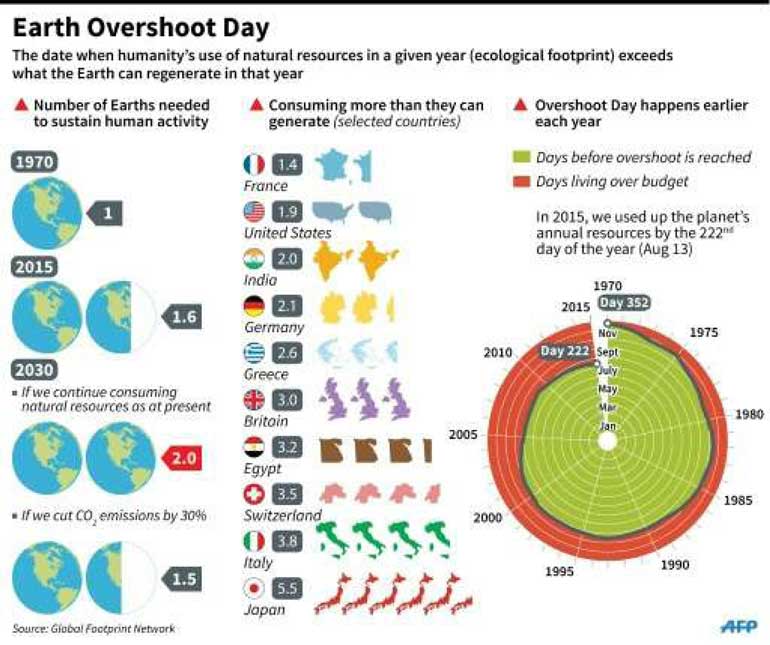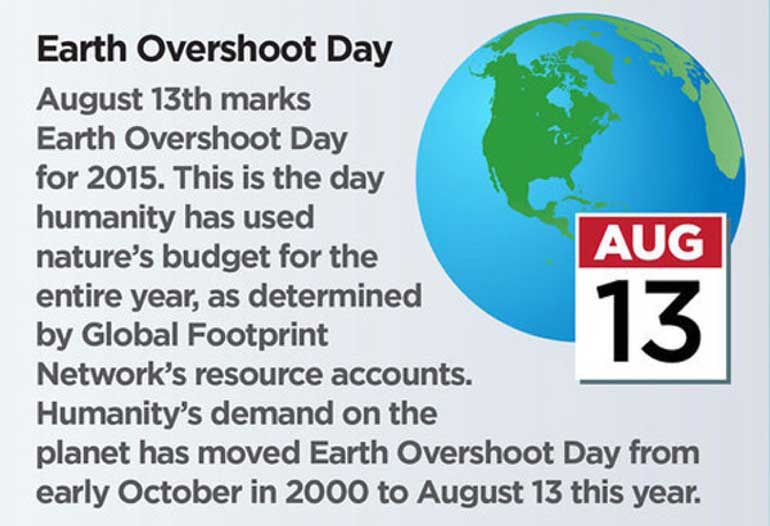Sunday Dec 15, 2024
Sunday Dec 15, 2024
Thursday, 27 August 2015 00:01 - - {{hitsCtrl.values.hits}}


For us Sri Lankans, many a destiny would have changed for better or worse on 17 August. That day most certainly has left an indelible mark on this year’s calendar and we may have not yet stopped discussing what happened or what did not happen on that particular day.
Lots of energy goes into these discussions and tempers too may flare. For some this is the only topic they would like to discuss and many seek salvation through what transpires on this day. For a day the people appear to be in charge and as the next day dawns they become subjects again and interesting times begin.
I am sure almost all of us did not recognise the symbolic importance of 13 August for us this year. 13 August simply was drowned among the election rhetoric and no media even mentioned the concept on the day. 13 August happened to be the Earth Overshoot Day for the current year. This day is also known as Earth Deficit Day and either way suggests that we are either overusing or borrowing resources. Though politics in its raw form is a much discussed subject, climate change, resource consumption, and our footprint on earth are not hot topics for the current constituency.
Living on borrowed time
How many of us realise that we are living on borrowed time? Do we really relate to our way of living and the resources that are spent in providing the comforts that we take for granted? Events such as what took place on 17 August literally are based on splurging and extraordinary promises. However when we witness Republicans trying to take on the Democrats with Donald Trump as an example, expenditure such as a billion dollars for electioneering is just nothing much it appears. 
We are quite aware that billions exist with little less than two dollars per day income. How are we to measure our accountability when we share this place called planet earth while co-existing with such disparities? We know the promises always are to elevate lifestyle, enable all to be proud owners of vehicles suitably financed which in turn will bring in a host of other needs.
Our individual lifestyles are supported and powered through the consumption of variety of resources – some of these resources appear at present to be quite abundant with definitely some scarce resources but all are finite. An example for the latter is rare earth metals which are not available to most, with China being the most important exemption. Yet the speed of growth in requirement had meant China imposing restrictions of trade on rare earths, ruffling many foreign feathers. Some reacted saying how unfair, while others initiated research to get out of the stranglehold knowing that the future definitely wants more of these.
Other than rare earths, copper, silver, gold, etc. too are becoming scarce, not to mention water and decent air to breathe. We will head back into the dark ages unless disruptive innovation alters the situation. Californians were privy to the feeling when their taps were running dry recently.
Driving the sustainability agenda
Earth Overshoot Day wants to remind us the need for responsible living and the importance of driving the sustainability agenda in future planning. I like to place on record some of the basic definitions as it is important to try to understand the relationships in some detail.
When we passed 13 August, what is meant is that we have consumed the natural resource budget allocated for us for the entire year 2015. We have consumed the natural resource allocation in less than eight months. This is an annual day of depletion which has been termed as the Earth Overshoot Day. From earlier records the overshoot day in 1970 was 23 December.
This naming and indirectly shaming the human community is carried out by the Global Footprint Network. Earth Overshoot Day is an initiative of Global Footprint Network, an international think tank that coordinates research, develops methodological standards and provides decision-makers with tools to help the human economy operate within earth’s ecological limits. Tools are provided decisions are made quite indifferently!
The date of Earth Overshoot Day is calculated with data from Global Footprint Network’s National Footprint Accounts. The first Earth Overshoot Day was on 23 December 1970. Today it takes more than 19 months to regenerate what’s depleted in the year. With the date on 13 August, we are six days earlier than last year.
All the world’s production and consumption for the rest of the year, this suggests, then runs up an environmental deficit beyond nature’s ability to regenerate itself and safely absorb our economic waste. It’s a highly conservative estimate, based on the best data available. However, the direction the mankind is taking is clear.
Ecological assets, a nation’s wealth
Though not well counted, ecological assets are a valuable component of nation’s wealth. Yet today, population growth and consumption patterns are putting more pressure on our ecosystems, as seen in water scarcity, soil fertility, deforestation, biodiversity loss, fisheries collapse and climate change.
Ecological Footprint accounting compares how much demand our consumption places on the biosphere, to the area, or supply, of productive land available to meet this demand – biocapacity. Both Footprint and biocapacity are quantified in global hectares.
Ecological accounting exposes the risks and opportunities that natural resource constraints pose to each nation. An ecological deficit occurs when the Ecological Footprint of a population exceeds the biocapacity of the area available to that country’s population. A national ecological deficit means that the nation is importing biocapacity through trade, depleting national ecological assets or emitting carbon dioxide.
It is easy to understand this when we view the import of water from another country. An ecological reserve exists when the biocapacity of a region exceeds its population’s Ecological Footprint. As per existing calculations Sri Lanka currently exhibits a biocapacity deficit – the percentage that ecological footprint exceeds biocapacity – with the value at 170%. The nation with the highest deficit is Singapore where the value stands at 50,000%. The corresponding ecological footprint for Sri Lanka stands at 25,000,000 global hectares.
The Ecological Footprint per capita is a nation’s total Ecological Footprint divided by the total population of the nation. To live within the means of our planet’s resources, the world’s Ecological Footprint would have to equal the available biocapacity per person on our planet, which is currently 1.7 global hectares. So if a nation’s Ecological Footprint per capita is 6.8 global hectares, its citizens are demanding four times the resources and wastes that our planet can regenerate and absorb in the atmosphere. The corresponding value for Sri Lanka is 1.2 global hectares. It appears that our citizen’s right now are demanding little less than the regenerative capacity of the planet. However, these calculations have been done for 2011 and I wonder how a fresh calculation would look like considering the enormous inflow of vehicles and surge in demand for consumption that has taken place in Sri Lanka.
It is simple to understand the philosophy. Overshoot Day is calculated by dividing the world biocapacity (the amount of natural resources generated by Earth that year), by the world Ecological Footprint (humanity’s consumption of Earth’s natural resources for that year), and multiplying by 365, the number of days in a calendar year.
Take a forest for an example. Timber is quite useful and how many crave to get hold of some mighty trees for their timber wishing to adorn every room of the house. If one consumes a certain quantity per year the forest do have the regenerative ability to replenish the stocks so as on 1 January next year the forest is ready to yield to man’s demand for the coming year. However, if the consumption led by greed increases there could be a position when the forest is unable to replenish at speed of extraction and a deficit will set in which would mean the death of the forest.
This line of reasoning can be applied to entire resource extraction stages and sources. With population booming and the needs expanding the current sources are yielding to the demand under stressed conditions. That is why the Earth Overshoot Day is moving steadily backward towards January. Will there be a year when the Earth Overshoot Day falls in January itself? Now with your understanding of this concept, what would that mean? Think about it. Yes I am serious!
Pushing the date back again
Knowing this concept, what are we to do? It is important to change as individuals and change too as institutions. Collectively implemented we can push back the date again. Multiple mechanisms exist in realising change. Some concepts are simple implementations of the well-known. Some are completely new and innovative.
The developed world may look more towards innovations to save the day and make the change. For the developing countries at this stage certainly applying the existing knowledge, ways and means count.
Hope those who forgot 13 August on their way to 17 August internalise some of these ideas now at least as navigating the future depends on much more than rhetoric from a public platform.